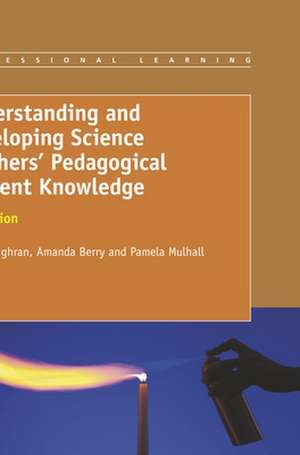Understanding and Developing Science Teachers' Pedagogical Content Knowledge: 2nd Edition: Professional Learning, cartea 12
Autor J. John Loughran, Amanda Berry, Pamala Mulhallen Limba Engleză Paperback – 31 dec 2011
Din seria Professional Learning
-
 Preț: 335.83 lei
Preț: 335.83 lei -
 Preț: 324.86 lei
Preț: 324.86 lei -
 Preț: 238.73 lei
Preț: 238.73 lei -
 Preț: 337.70 lei
Preț: 337.70 lei -
 Preț: 332.55 lei
Preț: 332.55 lei -
 Preț: 336.71 lei
Preț: 336.71 lei -
 Preț: 407.84 lei
Preț: 407.84 lei -
 Preț: 398.45 lei
Preț: 398.45 lei -
 Preț: 319.86 lei
Preț: 319.86 lei - 19%
 Preț: 555.77 lei
Preț: 555.77 lei -
 Preț: 330.42 lei
Preț: 330.42 lei -
 Preț: 323.04 lei
Preț: 323.04 lei -
 Preț: 326.21 lei
Preț: 326.21 lei -
 Preț: 329.12 lei
Preț: 329.12 lei -
 Preț: 358.11 lei
Preț: 358.11 lei -
 Preț: 312.97 lei
Preț: 312.97 lei
Preț: 393.35 lei
Nou
Puncte Express: 590
Preț estimativ în valută:
75.29€ • 81.81$ • 63.29£
75.29€ • 81.81$ • 63.29£
Carte tipărită la comandă
Livrare economică 16-22 aprilie
Preluare comenzi: 021 569.72.76
Specificații
ISBN-13: 9789460917882
ISBN-10: 9460917887
Pagini: 246
Dimensiuni: 210 x 297 x 13 mm
Greutate: 0.37 kg
Ediția:Nouă
Editura: Brill
Colecția Brill
Seria Professional Learning
ISBN-10: 9460917887
Pagini: 246
Dimensiuni: 210 x 297 x 13 mm
Greutate: 0.37 kg
Ediția:Nouă
Editura: Brill
Colecția Brill
Seria Professional Learning
Recenzii
“There has been a growing interest in the notion of a scholarship of teaching. Such scholarship is displayed through a teacher’s grasp of, and response to, the relationships between knowledge of content, teaching and learning in ways that attest to practice as being complex and interwoven. Yet attempting to capture teachers’ professional knowledge is difficult because the critical links between practice and knowledge, for many teachers, is tacit. Pedagogical Content Knowledge (PCK) offers one way of capturing, articulating and portraying an aspect of the scholarship of teaching and, in this case, the scholarship of science teaching. The research underpinning the approach developed by Loughran, Berry and Mulhall offers access to the development of the professional knowledge of science teaching in a form that offers new ways of sharing and disseminating this knowledge. Through this Resource Folio approach (comprising CoRe and PaP-eRs) a recognition of the value of the specialist knowledge and skills of science teaching is not only highlighted, but also enhanced. The CoRe and PaP-eRs methodology offers an exciting new way of capturing and portraying science teachers’ pedagogical content knowledge so that it might be better understood and valued within the profession. This book is a concrete example of the nature of scholarship in science teaching that is meaningful, useful and immediately applicable in the work of all science teachers (preservice, in-service and science teacher educators). It is an excellent resource for science teachers as well as a guiding text for teacher education. Understanding teachers’ professional knowledge is critical to our efforts to promote quality classroom practice. While PCK offers such a lens, the construct is abstract. In this book, the authors have found an interesting and engaging way of making science teachers’ PCK concrete, useable, and meaningful for researchers and teachers alike. It offers a new and exciting way of understanding the importance of PCK in shaping and improving science teaching and learning.”—Professor Julie Gess-Newsome, Dean of the Graduate School of Education, Williamette University
“This book contributes to establishing CoRes and PaP-eRs as immensely valuable tools to illuminate and describe PCK. The text provides concrete examples of CoRes and PaP-eRs completed in “real-life” teaching situations that make stimulating reading. The authors show practitioners and researchers alike how this approach can develop high quality science teaching.”—Dr Vanessa Kind, Director Science Learning Centre North East School of Education, Durham University
“This book contributes to establishing CoRes and PaP-eRs as immensely valuable tools to illuminate and describe PCK. The text provides concrete examples of CoRes and PaP-eRs completed in “real-life” teaching situations that make stimulating reading. The authors show practitioners and researchers alike how this approach can develop high quality science teaching.”—Dr Vanessa Kind, Director Science Learning Centre North East School of Education, Durham University
